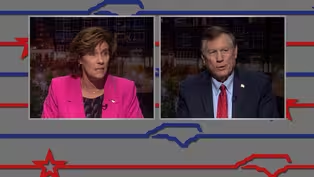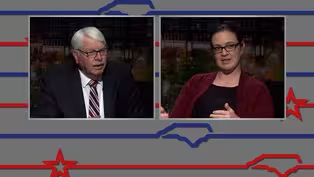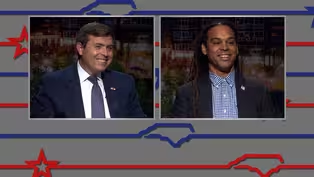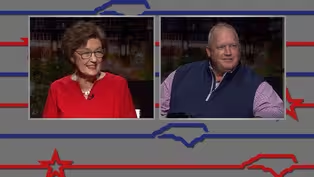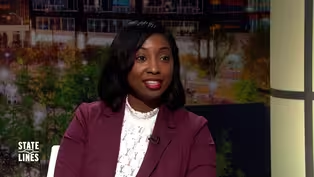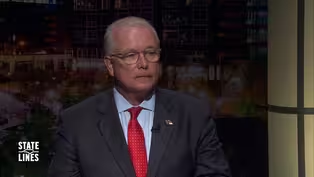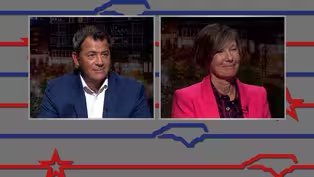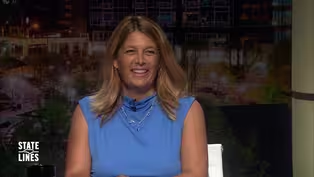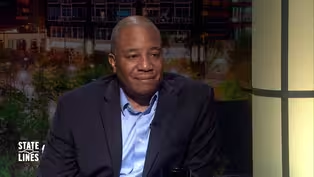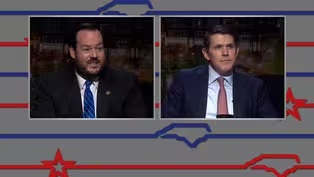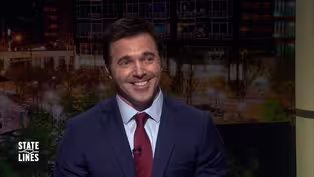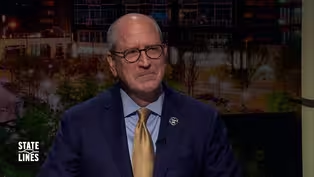
2024 NC Governor Candidate
Special | 26m 46sVideo has Closed Captions
Josh Stein (D) discusses his campaign for NC Governor.
Josh Stein, a Democrat running for NC Governor, discusses his 2024 campaign. Dawn Vaughan (News & Observer) and Rufus Edmisten (former NC gubernatorial candidate) examine the race with PBS NC host Kelly McCullen. These interviews were recorded on July 22 and August 16, 2024. Candidate Mark Robinson (Republican) was also contacted for an interview but did not respond as of August 27, 2024.
Problems playing video? | Closed Captioning Feedback
Problems playing video? | Closed Captioning Feedback
State Lines is a local public television program presented by PBS NC

2024 NC Governor Candidate
Special | 26m 46sVideo has Closed Captions
Josh Stein, a Democrat running for NC Governor, discusses his 2024 campaign. Dawn Vaughan (News & Observer) and Rufus Edmisten (former NC gubernatorial candidate) examine the race with PBS NC host Kelly McCullen. These interviews were recorded on July 22 and August 16, 2024. Candidate Mark Robinson (Republican) was also contacted for an interview but did not respond as of August 27, 2024.
Problems playing video? | Closed Captioning Feedback
How to Watch State Lines
State Lines is available to stream on pbs.org and the free PBS App, available on iPhone, Apple TV, Android TV, Android smartphones, Amazon Fire TV, Amazon Fire Tablet, Roku, Samsung Smart TV, and Vizio.
Providing Support for PBS.org
Learn Moreabout PBS online sponsorshipMore from This Collection
During major election cycles, PBS North Carolina's public affairs team sits down for in-depth conversations with candidates running for Governor and Council of State positions. PBS North Carolina has invited major party candidates to a one-on-one interview with State Lines host and executive producer Kelly McCullen. Interviews are scheduled throughout the summer.
2024 NC Commissioner of Insurance Candidates
Video has Closed Captions
Mike Causey (R) and Natasha Marcus (D) discuss their campaigns for NC Commissioner of Insurance. (26m 46s)
2024 NC Commissioner of Agriculture Candidates
Video has Closed Captions
Sarah Taber (D) and Steve Troxler (R) discuss their campaigns for NC Commissioner of Agriculture. (26m 46s)
2024 NC Commissioner of Labor Candidates
Video has Closed Captions
Luke Farley (R) and Braxton Winston II (D) discuss their campaigns for NC Commissioner of Labor. (26m 46s)
2024 NC Secretary of State Candidates
Video has Closed Captions
Elaine Marshall (D) and Chad Brown (R) discuss their campaigns for NC Secretary of State. (26m 46s)
Jessica Holmes, Democratic Candidate for NC Auditor
Video has Closed Captions
An interview with Jessica Holmes, Democratic candidate for NC Auditor (2024). (12m 32s)
Dave Boliek, Republican Candidate for NC Auditor
Video has Closed Captions
An interview with Dave Boliek, Republican candidate for NC Auditor (2024). (12m 58s)
2024 NC Lieutenant Governor Candidates
Video has Closed Captions
Hal Weatherman (R) and Rachel Hunt (D) discuss their campaigns for NC Lieutenant Governor. (26m 46s)
Michele Morrow, Republican Candidate for NC Superintendent of Public Instruction
Video has Closed Captions
An interview with Michele Morrow, GOP candidate for NC Superintendent of Public Instruction (2024). (12m 57s)
Maurice "Mo" Green, Democratic Candidate for NC Superintendent of Public Instruction
Video has Closed Captions
An interview with Mo Green, Democratic candidate for NC Superintendent of Public Instruction (2024). (13m 7s)
Video has Closed Captions
Wesley Harris (D) and Brad Briner (R) discuss their campaigns for NC Treasurer. (26m 46s)
Jeff Jackson, Democratic Candidate for NC Attorney General
Video has Closed Captions
An interview with Jeff Jackson, Democratic candidate for NC Attorney General (2024). (12m 50s)
Dan Bishop, Republican Candidate for NC Attorney General
Video has Closed Captions
An interview with Dan Bishop, Republican candidate for NC Attorney General (2024). (12m 44s)
Providing Support for PBS.org
Learn Moreabout PBS online sponsorship[bright music] - We sit down one-on-one with Democratic nominee for governor, Josh Stein, and the panel analyzes the 2024 gubernatorial race on this special "State Lines."
[bright music continues] Hello again, and welcome to this very special edition of "State Lines," where we're focusing on election 2024 by bringing you council-of-state candidates.
And at the top of that state ballot, or at least near the top, Josh Stein, Democratic nominee for governor, just below the presidential level.
Good to see you, sir.
- Thank you, Kelly.
Great to be with you.
- Well, you know, we've done this a time before.
Every time we meet, it's usually once a year or so, the state's growing, new voters are coming in, and new people are turning 18 and registering to vote.
So while millions know you, hundreds of thousands may not.
Who's Josh Stein?
- I am the Attorney General of North Carolina.
I'm a husband, I'm a father.
I am a proud North Carolinian and incredibly honored to be the Democratic nominee for governor of the state I love, which is why I am running for governor.
I love our state, and I believe in the promise of the state, which is that if you work hard, where you come from should never limit how far you can go.
And for us to deliver on that promise to our people, we have to invest in them and their future, so that together we can build a safer, stronger state, where our economy continues to grow and works for more people, where our public schools are excellent, where our neighborhoods are safe, and where our personal freedoms are protected, and we can build that state together.
- Philosophically, we'll get into business a bit later, but historically, if you notice, state attorneys general in the past, Easley comes to mind, Roy Cooper comes to mind.
You go back 40 years, Rufus Edmisten left the AG's office to run for governor in a strong Reagan year that year.
What is it about the Attorney General's office that makes A, the governor's seat appetizing in due time, but also, trains future governors?
- The thing about being the attorney general is you are the lawyer for the entire state, which means I represent all of state government, giving me a unique perspective on how the government operates and works.
And so, I think I understand the government well, but I also came outta the General Assembly.
I was eight years in the General Assembly, four terms in the State Senate, and so I understand the lawmaking process, and I understand how that all works.
I know a number of the legislators and can work with them to get good things done for the state.
So I think it's just a real understanding of how the government should be operating, and you learn how to get stuff done.
As attorney general, I identified a number of problems that were of grave concern to me, grave concern to North Carolinians, talking to parents who lost children to opioid overdoses, which absolutely breaks your heart.
Well, hearing that from them and then saying to my team, "I really want to tackle this issue."
So I worked on a bipartisan basis with the legislature to reduce over-prescribing of these pills back in 2017.
And then I worked on a bipartisan basis with other state attorneys general.
I helped to lead along with Tennessee, the Republican Attorney General of Tennessee, the Coalition of State Attorneys General, to take the opioid drug companies to court and win.
And we've won more than $50 billion to help people, who are struggling with addiction, get healthy and well.
Another issue that we confronted was this backlog of untested rape kits in North Carolina.
We did a survey, statewide, of all the law enforcement agencies in North Carolina, 16,000, we had 16,000 untested kits just sitting on shelves.
That was more than any other state in the country.
Absolutely unacceptable.
So we worked and we developed a strategy to attack the backlog and make sure that it never happens again in North Carolina.
And as of April this year, we've fully eliminated it so that we're finally delivering justice to victims, sometimes two or three decades later, which is terrible, but it's better late than never.
But we're also making arrests, solving cold cases, more than 114 to date, and we're making our community safer.
So I think when you're attorney general, you realize here's what I can do.
I can identify problems.
I can work creatively and on a bipartisan basis to attack those problems and help people have better lives.
- Your critics will point out to a few issues where it seems like the Attorney General's office wouldn't support the court case as it went through.
How do you decide when to represent the legislature, for instance, or a political issue that is important to the Republicans, when to support them versus when to back off, because that makes headlines, and I'm not sure many people understand the calculus.
- Yeah, well, it's pretty easy.
You just go to the Constitution.
My oath is to the Constitution of the United States and to the Constitution of North Carolina when they're not in conflict.
And so, I will defend laws that I don't like, because that's my job, is to defend the laws of North Carolina.
But if that law is unconstitutional, I won't, because my oath is to the Constitution, to the people of North Carolina.
It's not to be the trial lawyer for the legislature when they overreach, and that's how you draw the line.
It's pretty straightforward, honestly.
- How would you think your relationship would be with the General Assembly?
And let's talk about the Senate Republican leadership, who you know well, as well as your Democratic colleagues in the House and Senate.
- Yeah, I think we'll be able to work together.
We already have been.
Over these past seven-and-a-half years as attorney general, I went to the legislature and have worked with them on the opioid and fentanyl crisis.
We passed the Stop Act to reduce over-prescribing.
Tom McGinnis was a leader on that.
Jim Davis, former state senator, a leader on that.
But we've also worked the novel Opioid Control Act to deal with fentanyl.
Just this past summer, we passed a law, an anti-money laundering statute, again bipartisan, supported by law enforcement, and it's all about raising the cost of doing business on these criminal enterprises, these drug trafficking rings that make millions peddling poison to our people in our communities.
And so, you find a problem, and you work with them, and you can get good stuff done.
We did that on opioids and fentanyl.
We've done it on rape kits.
I talked about that accomplishment.
That wasn't my accomplishment alone.
It was done in concert with the General Assembly, appropriating the money, but it was also done with local law enforcement.
It was done with the scientist at the State Crime Lab.
It takes a lot of people coming together to solve complicated problems.
We modernized our laws protecting kids from child sex abuse, again, bipartisan with the General Assembly.
And just this summer, we modernized all the sex crimes, whether it's child pornography or sextortion or revenge porn, to deal with this new issue of artificial intelligence.
How do you apply old sex crimes in an AI world?
Well, we've now modernized our laws to do just that, bipartisan, work together to get good things done for people.
No party has a monopoly on good ideas.
And you have to be able to go and talk to people who agree with you on some issues and disagree with you on others and get things done.
- Well, it's one thing for our caucus to think you represent as the attorney for the legislature in the state of North Carolina, but a lot of these laws passed have to be enforced at the local level.
What is the, at least under your leadership, the relationship like?
What is it supposed to be between an AG's office, which is way beyond one person, and all those sheriffs and police chiefs out there, some of whom are in different political ads for and against you, quite frankly?
- Yes, yeah, well, what you do is you do your job.
And at the Attorney General's Office, we play a really important role in the entire criminal justice system.
We have something called Sheriff's Training and Standards and Criminal Justice Training and Standards.
They're the ones who set the criteria of eligibility to become a law enforcement officer, and they certify them.
And if somebody oversteps, they can decertify somebody.
We also have the Justice Academy, which trains law enforcement to meet the requirements to become certified.
We have the State Crime Lab, which analyzes crime scene evidence.
So we, on a daily basis, at the Department of Justice are working with local law enforcement to keep our people safe.
And there will be times when politics gets into the way of how we operate, but fundamentally, this issue of criminal justice and public safety, it is not a partisan issue.
We should be working together to keep people safe.
- Do you carry a lot of that into the governor's office if you win, or other kitchen table issue.
If I had to ask you, kitchen table issue as governor, as opposed to AG, what are those, because so far, the ads have been more personal between you and your opponent, and what are the issues for you?
- Yeah, what's interesting is when you're the attorney general, we actually work a lot of issues.
So, kitchen table issues, what is the safety of my neighborhood?
We've talked about that issue.
What is the quality of the school my kids go to?
I've represented the state in the case called Leandro on what is adequate funding of public education in North Carolina, because every child in North Carolina has a constitutional right to a sound, basic education.
And the Supreme Court has been clear that we have not, as a state, the legislature has not been fulfilling that commitment to the young people of North Carolina.
So I've been representing the people, trying to ensure that we're adequately funding public schools.
Healthcare, how am I gonna get healthcare to keep me and my family healthy?
Well, we defended the Affordable Care Act all the way to the United States Supreme Court.
And I've championed Medicaid expansion for more than a decade and was incredibly gratified, again, on a bipartisan basis, to see this state finally say yes to the Federal Government's offer, so that now we have more than a half a million North Carolinians neighbors who have insurance today, who did not in December.
So there's always these issues where even though I've got a unique perspective as the attorney general, it's kitchen table stuff.
- On public education, do you think as governor you'd be the first one to come to the table with, "This is enough money to fully fund education "in North Carolina, taking care of our teachers?"
We're both, well, one side could be very unhappy, but the other side is accepting and saying, "We've reached full funding."
- Well, we know what the plan is.
The plan has been agreed to by the plaintiffs, the people who brought the action.
We hired outside consultants.
We brought together a blue-ribbon commission.
We came up with a plan that would adequately fund teachers, adequately provide sufficient support staff to help teachers, counselors, school nurses, adequately provide pre-kindergarten slots for children, so that they get the skills to succeed once they get to kindergarten in a healthy, safe environment.
We've figured out what we need to do to invest in community colleges, to help people get the skills they need to enter the workforce.
So we know what to do.
It's just a matter of prioritizing it and funding it.
And here's the thing, when you look at the schools that are really taking it on the chin, yes, it's all the public schools, but it's especially the schools in the rural parts of the state.
Those are the places that don't have the tax base in their counties to supplement what the state provides.
So it's not Wake, it's not Mecklenburg, it's not Guilford, it's not Durham, it's the smaller rural counties, which are disproportionately gonna be represented by Republicans.
So I wanna work with the Republican Legislature to help their kids have the absolute best chance at a successful future.
And the way we do that in North Carolina, and the way we do that in this country is to have a K-12 system that is the best possible, so that our kids are learning to think critically.
They're learning to read, write, do math, understand science, understand history, understand patriotism.
And if we can teach these skills to young people, they will thrive in the future.
- So you fight for more funding for traditional public education.
We have a budget surplus.
What room is there in your political opinion, on your platform, possibly, maybe not, platform's the wrong term, but in your mind for those opportunity scholarships that are gonna be funded under your proposed administration, because they're already baked into budget and into law, room for both?
- There is room when we have fully funded public education, and we are so far away from doing that.
We cannot afford to take hundreds of millions of dollars of taxpayer public dollars away from our public schools and public school kids to give to unaccountable, private schools.
What they have now done that's different than the way it was originally pitched to the people was what they said originally is, "This is gonna be for low income people "to be able to get some subsidy to go to a private school."
Now they're saying, "We don't care if your child "ever went to public school, "and we don't care what your income is."
You could be a multimillionaire sending your kid to some private academy, and now the taxpayer is gonna pay to subsidize your child getting that education?
Obviously, every parent chooses what's best for their child in terms of what school is gonna help them succeed.
But public dollars should stay in public schools, not go to private schools.
- Do the issues stay roughly the same between administrations, education, transportation, or are new issues now on the horizon that you could see being placed on that proverbial kitchen table as a new topic of conversation for families going forward decades?
- Well, we surely didn't talk about broadband five, six, eight years ago, whatever it was.
That is now critical infrastructure going forward.
And if communities across North Carolina, even in rural North Carolina, do not have adequate broadband, they're not gonna make it.
They cannot succeed.
Business can't succeed.
Their kids can't get the education they need.
Their healthcare access will not be as available.
So we want good broadband, and that's the kind of thing we hadn't thought about a while back.
Currently, we have funding from the Federal Government to install broadband to the far reaches of the state.
As governor, it will be instrumental to make sure that that money gets administered well and effectively and makes a transformative difference in people's lives.
I talked about artificial intelligence and the scary concept of how it can be misused to commit crimes, sex crimes against people, modernizing our laws to deal with sex crime, I mean, with artificial intelligence, that's something we never would've thought about two years ago.
So there's always gonna be new things that come on the horizon, new economic opportunities.
We are becoming a hub for clean energy battery technology.
Not only is there Toyota and its $14 billion investment, but there are three other major battery manufacturers coming into North Carolina, that's so exciting.
I don't think we thought about EVs a few years ago.
So you've gotta be on your toes, ready to understand what's going on in the world and respond so that North Carolina can succeed.
- If you followed Roy Cooper as governor, it'd be two Democrats in a row, do you take any of his platform?
Do you feel any obligation to fulfill anything he may have not gotten accomplished with the Republicans and the legislature?
Or should North Carolinians go, "New governor, modified agenda."
- Yeah, I will be my own governor for sure.
I have my own way of being, my own views of the world.
I will say that Governor Cooper and I see the world in a pretty similar fashion.
I had the honor of working with him closely when he was attorney general.
I headed the Consumer Protection division.
So I've known and worked with him for about 25 years now.
I think extremely highly of him.
And the big picture issues, strong public schools, a healthcare system that is accessible, affordable, and high quality.
Infrastructure, whether it's roads or broadband, keeping people safe, public safety, those priorities will likely stay the same.
- Well, I appreciate you giving me up to 25 minutes for a full, in-depth conversation.
I wanna pivot now with what's left of this half hour show, talk about your leadership style.
I've seen you be a pit bull in the State Senate when I was in the press pool.
I've seen nice guy, Josh Stein.
I've seen Josh Stein in the press release and in the web video.
You can wear many hats from a personality and performance standpoint in this great political theater.
But what is your leadership style?
- It's about being who I am.
I think I'm a nice person, and I like to treat people respectfully.
I like to be treated respectfully.
And that doesn't mean that we have to agree on every issue, 'cause we won't.
I mean, there are times where I think there are strong sides of the same issue.
So I'm not looking for people to agree with me, but I'm looking for people to have a foundation of respect, and then let's tackle issues.
You may have a good idea, I may have a good idea, let's work on it and solve it together.
In terms of my leadership style, it's really about attracting really good people, and I have been blessed at the Attorney General's Office, incredibly talented, public-spirited people have come to join my administration as attorney general, and they're doing great things for the people every day.
I just wish folks could understand how great they're being served by the people at the Attorney General's Office.
That's the kind of governor I want to be.
Bring great people in, work with them to set our agenda, to set our mission, and then ensure they succeed by supporting them in that work.
- All right folks, if you're new to North Carolina, that's Josh Stein, Democratic nominee for NC Governor on the 2024 ballot.
Mr. Stein, thank you for your time making us part of your schedule, always good, and you're always welcome on "State Lines."
Thank you, sir.
- Thanks, Kelly.
[bright music] - Well, absentee ballots will start being mailed out in early September, in-person, early voting begins October 17th, 2024 and ends on November 2nd, 2024.
Traditional election day will be November 5th with absentee ballots facing the deadline.
Also, on November 5th, they must be at your local elections office.
And if you vote, you will be asked to present a photo ID.
Well, that's our good government segment for this part of the show, but let's pivot towards analysis.
Rufus Edmisten, former attorney general, former gubernatorial candidate, Dawn Vaughan with the "News Observer" here.
To speak briefly about this race, we invited Mark Robinson numerous times to be on.
We did not hear back from his campaign or from him personally.
He never said no, he just never answered us, Rufus.
So we'll talk about the race for what it is.
We have Josh Stein in here.
He says he's his own man.
He is the attorney general.
What is it about the path that Mike Easley follows it, Roy Cooper follows it, now Josh Stein?
- Well maybe a few people can remember.
I was attorney general for 10 years, beginning in '74, and it's a great training ground.
You have to know a great deal about every agency.
You represent them.
You have to know about law enforcement.
The SBI used to be under the attorney general.
They've stripped it a lot now, but it's a training ground, because you have to solve problems for people, and you don't make that many enemies.
Now, you give legal rulings and somebody wins and somebody loses, but it's a good office to run for governor from, and we've had some very successful ones.
Mike Easley, Governor for Life Cooper.
Mine didn't work out that year.
It was a bad year.
- With Ronald Reagan, Rufus.
- Yes, it was.
- Ronald Reagan in '84 was a tough year for any Democrat, I would think.
- But we're gonna talk about polls on another show, but I can tell you that in '84, a week out I was 52-48.
Polls don't mean anything.
- Dawn, this is an interesting race.
The polls are here, depending which poll you look at, and then we gotta keep this at a higher level from a policy perspective, but the attorney general moving up.
I've seen this happen before.
It seems to be a place where you do get some state training.
But on that lieutenant governor's side, Jim Hunt, the most prolific governor in our state, was also lieutenant governor.
So, how do you size up this race of voters when they look at experience for the Republican and the Democrat?
- I think people that watch the show know who all the council state members are, but a lot of just your average voter may not pay attention beyond the top names you hear, which is usually governor, lieutenant governor, attorney general.
And so you got a little bit of that name recognition.
Everyone in government has worked with you.
You've maybe already served in the State House or Senate.
So it's just kind of you working your way up the political ladder.
And so you can also use that time where you're in office to have that attention and run at the same time.
So I think it helps versus if you were just a candidate running for governor that wasn't already in office or just was in a much more low profile job.
- Well you have to learn to make decisions too.
It's not a wishy-washy office, and it's a good decision maker.
And if you've weathered well as attorney general, you've got a good shot at being governor.
- Rufus, how do you balance being an attorney general, that's a legal office, a lawyer's office?
You could turn inward and work on the state's legal business or you can go out and be an advocate for citizens and consumers.
You saw Easley do that and make some campaign ads.
You've seen other attorney generals be attorney general.
How do you balance being that public-facing person that needs that branding versus a hardworking attorney general?
- You do like I did.
When I came from Washington, I'd been to all this big Watergate stuff, this and that, but I walked in that room, and there were lawyers there with 200 years experience and I said, "Now look, you leave the politics to me, "and I'll leave the lawyering to you."
So you let your professional staff do the lawyer work, and then you concentrate on consumer protection, crime prevention and things like that.
That's how you get it done.
- What is the politicking like from an attorney general's perspective?
It would seem to be different than if you were a legislator or a governor.
- Well you're, first of all, statewide.
You're on the news a lot.
People, like Dawn, cover you, because the issues like consumer protection, fraud, that kind of thing.
For instance, when you have a storm, you have the fraudsters come through.
I saw Attorney General Josh Stein on TV the other day saying, "Watch out for the fraudsters in the cleanup area."
So, it's one where you get a lot of attention.
- Dawn, would being attorney general or being lieutenant governor, does that matter as much in modern campaigning as just being the Republican or the Democratic nominee to your respective parties and to your constituents and those who support you and oppose you?
- I really think that the presidential race is gonna be a big factor on down ballot.
It's weird to think that you're at this top position of the entire state and that's still considered down ballot.
You know, the ballot's really long.
There's more people even further down, of course, the entire general assembly.
But yeah, some people don't pay attention, and they're gonna check D or R unless they wanna vote for third party on ballots.
And those television ads, if it's constant, like in every time you turn on the TV, or you're looking on your phone or whatever, and you see these attack ads against each other, eventually that kind of seeps in.
You hear a line here, see a headline there, and that could factor in whether or not somebody wants to vote for them.
But I think party is probably the biggest factor.
Maybe if they knew them personally, they would vote for them, but I think it comes down to general party.
- What do you make about the makeup of these candidacies Used to, you would imagine the good old Democrat would ride that pickup truck through rural North Carolina, and the Republican would be the slick, suit-wearing lawyer guy from the Ivy League.
In this race, you've got Mark Robinson is the every guy out in the country riding the roads, and you've got Josh Stein, who's very competent, very much an attorney, looks great.
What about the branding and the imagery?
- It has so changed.
When I first ran for office in '74, it was basically rural.
I was a rural boy.
I grew up on a farm.
We're very suburban now, getting more and more every day.
And everybody has to stick with what they are though.
It's like if Josh tried to change his persona from who he is or if Mark Robinson tried to change, it would come over as a fake.
So you gotta run with what it is, but North Carolina has changed drastically.
We're just a totally different state.
- And Robinson also is from the city, right?
He's from Greensboro.
- Well, yes.
- So a smaller city, but he appeals to rural voters in a way.
He spent most of his working life working in different factories.
It's different than when you spent your career as a lawyer and in the legislature, which Stein has done.
- What do you make of this practice now as a campaign practice, where neither party really wants to debate in an open campaign season, and it's difficult to get interviews, and in some cases, impossible to get interviews or access.
How has that affected the work and your coverage of any of these races across the state?
Most, but the governor's what I'm thinking, - Yeah, they don't want people, they don't wanna be questioned.
And [laughs] if you wanna run the government, you wanna be in charge of millions of people, and you can't take questions from anyone that's not particularly favorable to you, like you can't be challenged, it doesn't seem like a government to me.
You should be able to debate, talk to your opponent.
You should talk to reporters, talk to, obviously, the people that are voting for you, but you need to get out there in a wide range of places, not just your own little lane of where you're comfortable, 'cause that doesn't necessarily mean you're gonna win.
Sometimes it does, but not always.
- But their message is getting out.
They can reach very easily by social media advertising, direct videos and they'll say, "Well, they don't need us anymore," but I disagree with that, but there's- - Yeah, and you should, there needs to be transparency.
Like who are you?
And people need to be questioned.
- All right, Rufus, Dawn, thanks for the quick analysis here on the governor's race.
We'll have you on again real soon.
Thank you folks for watching this very special edition of "State Lines."
For more voting information, we're hosting a small website, [bright music] pbsnc.org/vote.
Please check that site out and get the information you need.
I'm Kelly McCullen, and we'll see you next time.
[bright music continues] - [Announcer] Quality public television is made possible through the financial contributions of viewers like you, who invite you to join them in supporting PBS NC.

- News and Public Affairs

Top journalists deliver compelling original analysis of the hour's headlines.

- News and Public Affairs

FRONTLINE is investigative journalism that questions, explains and changes our world.












Support for PBS provided by:
State Lines is a local public television program presented by PBS NC
